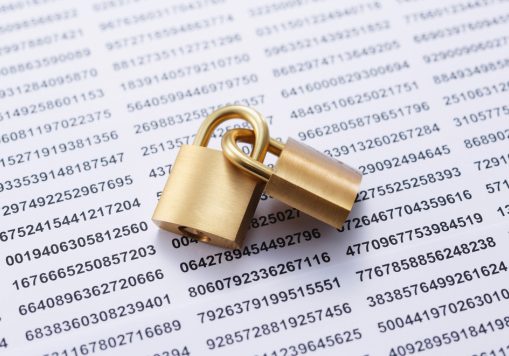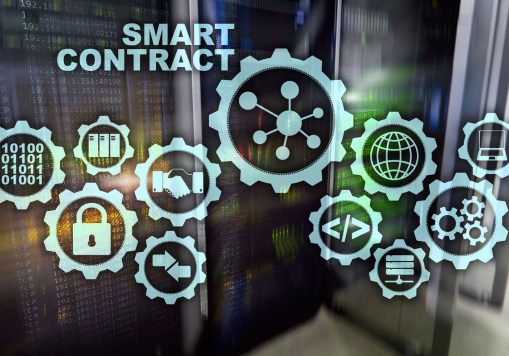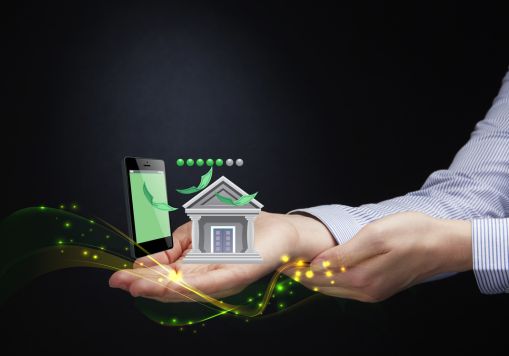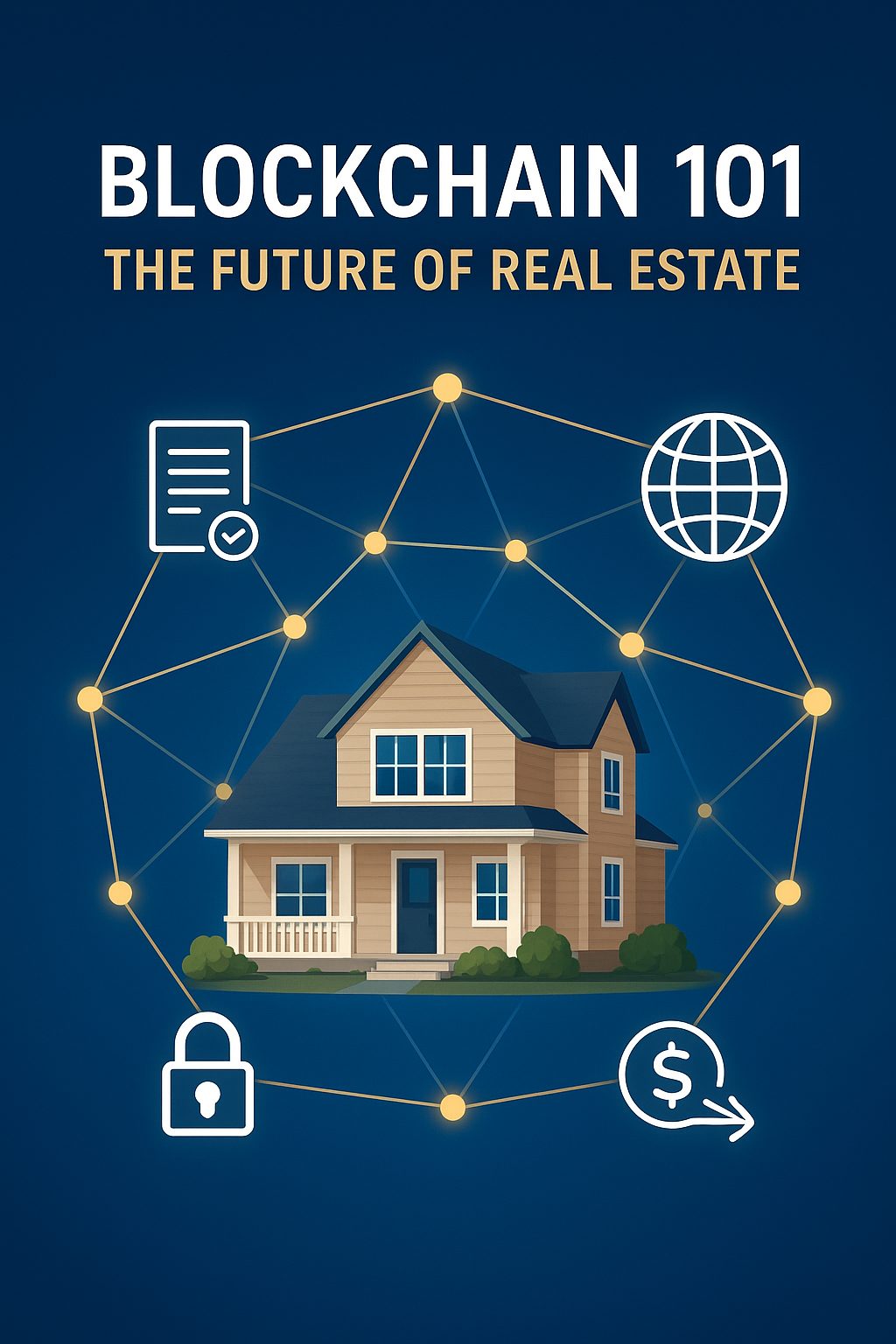Why Blockchain Matters in Real Estate
Real estate has always been known for paperwork, delays, and middlemen. Blockchain changes that by making transactions faster, safer, and easier.

Secure Property Records
- Records stored on blockchain can’t be changed or faked
- Helps prevent fraud and protects ownership rights

Smart Contracts
- Automated digital agreements
- Example: "If the buyer sends payment, then the deed automatically transfers"
- No delays, no missed signatures

Faster Transactions
- Payments and contracts can process in minutes instead of weeks
- Reduces reliance on banks, escrow and endless back-and-forth

Fractional Ownership (Tokenization)
- Properties can be divided into "digital" shares
- Investors can buy a fraction of a property, just like buying stock
- Makes real estate more accesible to everyday people

Real-World Examples of Blockchain in Real Estate
-
Propy (USA): Facilitated the first U.S. blockchain-based home sale in Florida (2022). Homes in California and Arizona have also been sold entirely through smart contracts.
-
Lofty AI (USA): Lets investors buy rental property shares for as little as $50, earning income through tokenized ownership.
-
Roofstock onChain (USA): Sold a single-family home in South Carolina as an NFT for $175,000—an industry first.
-
Dubai Land Department (UAE): Records real estate transactions on blockchain to eliminate fraud and speed up transfers.
-
Sweden’s Land Registry: Tested blockchain for property records and found it could save billions by cutting paperwork.
What This Means for You
Blockchain isn’t just about Bitcoin - it’s reshaping how we buy, sell, and invest in property. Whether it’s securing ownership, cutting closing times, or opening new investment opportunities, blockchain is making real estate smarter, faster, and more accessible.

How Blockchain Simplifies Real Estate
From Paper to Blockchain: A Smarter Way to Buy & Sell Property
Buyer and seller agree on price and terms
- Traditional: 1 - 3 days (offers, counteroffers, signatures)
- Blockchain: Same (normal negotiation still required)
Both sides set up secure digital wallets to hold funds & property tokens
- Traditional: N/A (handled by banks)
- Blockchain: 10 - 30 minutes to set up a wallet
ID's confirmed for legal compliance (KYC/AML)
- Traditional: 2 - 5 days (bank paperwork, financial checks)
- Blockchain: 30 minutes - 24 hours (online ID verification)
A digital contract is created: "If buyer pays, deed transfers"
- Traditional: 3 - 5 days (lawyers draft & review contracts)
- Blockchain: 1 - 2 hours (smart contract template with terms)
Buyer deposits funds into the smart contract escrow
- Traditional: 3 - 7 days (wire transfers, escrow account setup)
- Blockchain: Minutes (funds sent to smart contract instantly)
Title company clears liens or issues
- Traditional: 1 - 3 weeks (manual record searches)
- Blockchain: Hybrid - currently still days / weeks until counties adopt blockchain fully
- Future vision: minutes (on-chain title history)
Smart contract executes: funds go to seller, deed to buyer
- Traditional: 2 - 5 days (final approvals, signatures, funds release)
- Blockchain: Instant - once conditions met (smart contract executes)
County record updated (hybrid system today)
- Traditional: 2 - 7 days depending on county backlog
- Blockchain: Instant blockchain record + 1 -2 days county upload (hybrid today)
Ownership recorded on blockchain for permanent proof
- Traditional: 2 -7 days (county recorders update ownership)
- Blockchain: Instant blockchain entry (plus county filing if hybrid)
Both parties keep blockchain record for future security
- Traditional: Weeks later you get final paperwork and title insurance
- Blockchain: Instant proof stored on-chain, downloadable anytime
Compare how a blockchain transaction compares to traditional
- Traditional Closing: 30 - 60 days on overage
- Blockchain Assisted Closing (today): 1 - 2 weeks (title is the slowest part)
- Future Full Blockchain Closing: Same day to 3 days
Step-by-Step Processes
-
Agree on price and terms (normal part)
✅ Buyer and seller sign the usual purchase agreement (with your agent) -
Pick a blockchain platform & make digital wallets
✅ Both sides create secure “digital wallets” (like online bank accounts for crypto) and join the platform that will run the sale -
Verify identities (KYC - Know Your Customer)
✅ The platform checks IDs so the sale meets legal rules - like showing a driver’s license -
Create the smart contract for the deal
✅ A smart contract is a computer program that holds the rules (price, deposit, closing conditions). It won’t run until the rules are met. -
Deposit funds into escrow (on-chain or hybrid)
✅ Buyer puts money into the smart contract’s escrow so everyone knows the funds are real and protected -
Do title search & clear any issues (same as usual)
✅ A title company or lawyer looks for liens or problems and fixes them before closing -
Trigger the smart contract to close
✅ When title is clear and funds are confirmed, the smart contract automatically transfers the digital deed or ownership token and releases the money to the seller -
Record the deed (on-chain hash + county record)
✅ The deed file is saved and a permanent fingerprint (a cryptographic hash) or token is recorded on the blockchain. The county record may still get an official paper or electronic filing depending on local rules. -
Move money to seller’s bank and finish administrative tasks
✅ Funds convert to regular dollars if needed and payoffs/commissions happen. Utilities, mortgage payoff, insurance - all updated -
Keep the immutable record for future proof
✅ The blockchain entry proves the chain of ownership can’t be changed later
Risks and Legal Notes
🚫 Things to be aware of....
-
Property law is local - counties and states have different rules. Always involve a real estate attorney and the county recorder/title company before assuming an on-chain deed is enough.
-
Securities rules may apply to tokens - treat tokenization as a securities offering until counsel says otherwise.
-
Security hygiene is critical - losing a private key can mean losing access to tokens.
-
NEVER SHARE YOUR SEED PHRASES WITH ANYONE!
-
Tax reporting and investor disclosures still apply.
-
Currently, only three states allow a full real estate transaction from open > close on the blockchain. Those states are AZ, CO and FL with more in the pipeline.
-
The State of TN only allows property listings to be on the blockchain. Closings, escrow and other events are handled traditionally.


